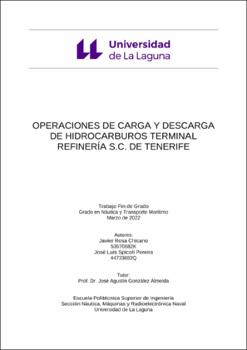Operaciones de carga y descarga de hidrocarburos terminal refinería s.c. de Tenerife
Fecha
2022Resumen
A fin de documentar al lector y el sector sobre el trabajo que se realiza en la Marina
Mercante, se pone a disposición un estudio que abarca el ámbito de trabajo marítimoterrestre. Este puede ser desempeñado con diversas titulaciones, una de ellas la
impartida en la Universidad de La Laguna, sección de Náutica y Transporte Marítimo.
El método empleado ha sido, por un lado, trabajando de primera mano en la Terminal
como patrón-operario, por otro, estando embarcado como alumno en prácticas en
buque petro-químico y, además, se ha podido disponer de información adquirida a
través de profesionales con experiencia y con la cualificación necesaria para compartir
sus conocimientos, así como de libros y manuales oficiales para desempeñar este tipo
de operaciones.
Los resultados y conclusiones más relevantes destacan que, gracias a la titulación
que obtenemos, podremos ser capaces de movernos en un ámbito de trabajo muy
amplio, desde trabajar en tierra hasta operar en un buque de grandes dimensiones y
en diversas terminales. Lo importante es adquirir conocimientos y no detener ese
proceso, siempre evolucionar e intentar estar al día ya que es una profesión que
entraña grandes riesgos. El trabajo para realizar una carga o descarga de combustible
debe ser meticuloso y hace falta de mucha experiencia para ser llevado a cabo. Esta
Terminal es un gran ejemplo de ello, destacada por su historia a lo largo del tiempo
operando con este tipo de buques. In order to document the reader and the sector about the work carried out in the
Maritime Merchant, a study that covers the field of maritime-shore work is made
available. This can be aviable with different qualifications, one of them being the taught
at the University of La Laguna, Nautical and Maritime Transport section.
The method followed has been on the one hand, working at the Terminal as a skipperoperator and, on the other hand, embarked with internship status as deck cadet
onboard a petrochemical ship. Also, the gathering of information obtained through
proffesionals with the necessary qualification to share their knowledge as well as
official books and manuals to carry out this type of operations.
The most relevant results and conclusions highlight that, the degree that we achieve,
will be able to move in a very wide range, from working on shore to operating on a big
LOA ship or at any terminals. The important thing is to acquire knowledges and not
stop doing it process, always evolve and try to keep updated every day because it is a
profession that carries great risks. The work to perform a loading or unloading of fuel
must be meticulous and it takes a lot of experience to do it. This Terminal is a great
example of this highlighted by its history over time operating with this type of vessels.





